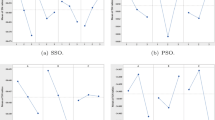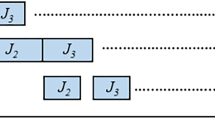Abstract
The paper considers the three‐machine open shop scheduling problem to minimize themakespan. It is assumed that each job consists of at most two operations, one of which is tobe processed on the bottleneck machine, the same for all jobs. A new lower bound on theoptimal makespan is derived, and a linear‐time algorithm for finding an optimalnon‐preemptive schedule is presented.
Similar content being viewed by others
References
I. Adiri and N. Aizikowitz (Hefetz), Open-shop problems with dominated machines, Naval Res. Log. 36(1989)273-291.
I. Bárány and T. Fiala, Nearly optimum solution of multimachine scheduling problems, Szigma 15(1982)177-191 (in Hungarian).
B. Chen and V.A. Strusevich, Approximation algorithms for three-machine open shop scheduling, ORSA J. Comput. 5(1993)321-326.
T. Fiala, An algorithm for the open-shop problem, Math. Oper. Res. 8(1983)100-109.
J.N.D. Gupta, A flowshop scheduling problem with two operations per job, Int. J. Prod. Res. 35 (1997)2309-2325.
J.W. Herrmann and C.-Y. Lee, Three-machine look-ahead scheduling problems, Research Report No. 92-93, Department of Industrial Engineering, University of Florida, Gainesville, FL, USA, 1992.
T. Gonzalez and S. Sahni, Open shop scheduling to minimize finish time, J. ACM 23(1976)665-679.
A. Kononov, S. Sevastianov and I. Tschernykh, When difference in machine loads leads to efficient scheduling in open shops, Ann. Oper. Res. 92(1999), this volume.
E.L. Lawler, J.K. Lenstra, A.H.G. Rinnooy Kan and D.B. Shmoys, Sequencing and scheduling: Algorithms and complexity, in: Handbook in Operations Research and Management Science, Vol. 4, Logistics of Production and Inventory, eds. S.C. Graves et al., North-Holland, Amsterdam, 1993, pp. 445-522.
T. Masuda, H. Ishii and T. Nishida, A solvable case of n/3/O/C max problem, Technol. Reports Osaka University 40, No. 1986, 1990, pp. 1-7.
Y.D. Neumytov and S.V. Sevast'janov, An approximation algorithm with an exact bound for the three-machine problem with the opposite routes, Upravlyaemye Sistemy 31(1993)53-65 (in Russian).
C. Oğuz, B.M.T. Lin and T.C.E. Cheng, Two-stage flow shop scheduling with a common secondstage machine. Comput. Oper. Res. 24(1997)1169-1174.
M. Pinedo and L. Schrage, Stochastic shop scheduling: A survey, in: Deterministic and Stochastic Scheduling, eds. M.A.H. Dempster et al., Reidel, Dordrecht, 1982, pp. 181-196.
V.S. Tanaev, Y.N. Sotskov and V.A. Strusevich, Scheduling Theory. Multi-Stage Systems, Kluwer, Dordrecht, 1994.
Rights and permissions
About this article
Cite this article
Drobouchevitch, I., Strusevich, V. A polynomial algorithm for the three‐machineopen shop with a bottleneck machine. Annals of Operations Research 92, 185–210 (1999). https://doi.org/10.1023/A:1018982630730
Issue Date:
DOI: https://doi.org/10.1023/A:1018982630730




